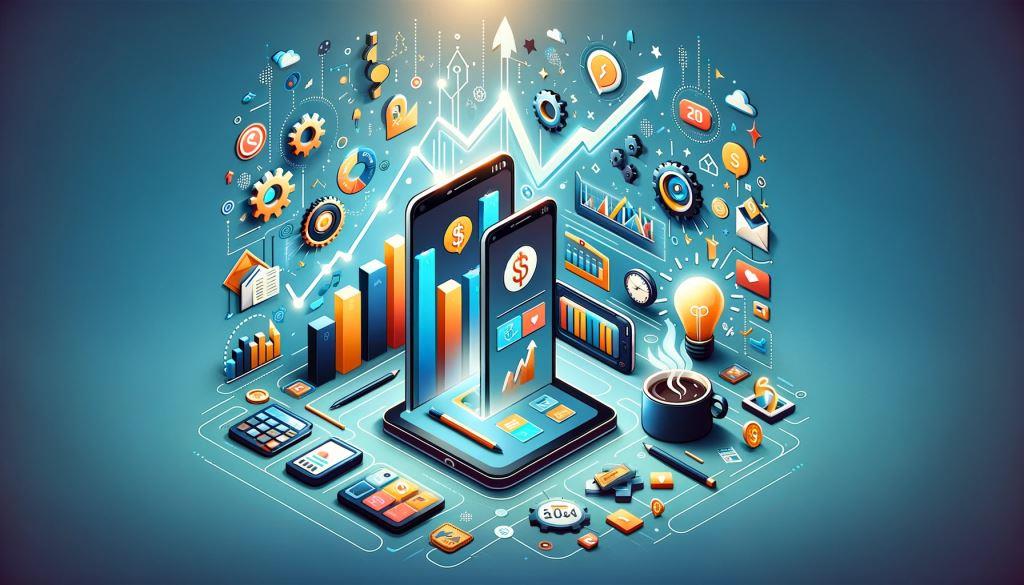Content
Application development is not just the process of creating a software product. This is also a way to make money. After all, what’s the point of creating an application if it doesn’t generate income?

Why is it important to monetize a mobile application?
Monetization of mobile applications https://blog.advertmobile.net/monetizacii-prilozhenij is important for developers and owners of these applications for several reasons:
- Financial Stability: Monetization helps create a stable source of income, which in turn helps finance ongoing operating expenses such as hosting, maintenance, and app updates.
- Reinvestment: Proceeds from monetization can be used to improve the current application or develop new products.
- User acquisition and retention: If the app is free, then monetization through advertising or in-app purchases can help attract and retain more users.
- Support for quality: Having a stable income provides the opportunity to hire qualified specialists and invest in the quality of the product.
- Business Model: Monetization can serve as part of a broader business model, including affiliate programs, integrations, and value-added services, creating additional revenue streams.
- Competitiveness: In a highly competitive environment, the ability to monetize can differentiate an app from competitors that offer similar services for free but with lower quality or limited features.
- Customization: Monetization may involve the introduction of additional paid features that allow users to customize the application to their individual needs.
- User interaction: Monetization often requires active interaction with users, which can provide valuable feedback to improve the application.
- Application Lifespan: The ability to generate revenue can extend the lifecycle of an application, ensuring its long-term sustainability in the market.
- Attracting investment: Apps with a successful monetization model can attract the attention of investors, which provides an opportunity for further growth and development.
In today’s environment, where mobile apps are becoming more common, the ability to effectively monetize your product can be a key success factor.
Basic monetization methods
Advertising in the application
This monetization method is often used in free applications and involves displaying advertising banners or videos. It is well suited for applications with a large audience, since the main revenue model here is impressions and ad clicks.
Advantages:
- Minimum barriers to entry.
- Ability to work with various advertising networks.
Flaws:
- Advertising can scare users away.
- Low revenue per user (eCPM).
Example of successful monetization: Facebook and Instagram
These social networks successfully use advertising to monetize their mobile applications. Advertisements are integrated into the feed in such a way as to best match the interests of the user.
Paid versions of applications
In this case, users pay a one-time fee to download the application. This method works well for apps with unique features that are a must-have for a specific target group.
Advantages:
- High level of income per user.
- No need for advertising within the application.
Flaws:
- Large barriers to entry.
- Active promotion and marketing is required.
Example of successful monetization: Procreate
This iPad drawing app costs money from the moment you install it, but its functionality and quality justify the price. This model made it possible to create a high-quality product that does not irritate users with advertising.
Subscriptions
Subscriptions involve regular payments for access to functionality or content. This is a popular monetization method for media apps, streaming services, and online courses.
Advantages:
- Constant and predictable income.
- Possibility of providing a variety of tariff plans.
Flaws:
- Difficulty in retaining users.
- Requirement of high quality content and constant updating.
Example of successful monetization: Spotify
The service offers a free version with ads and a paid subscription without ads and with additional features. This way, users can try out the service first and then upgrade to a paid subscription.
In-game purchases
This method is often used in mobile games and allows users to purchase virtual goods or services.
Advantages:
- High degree of involvement and willingness to purchase from active users.
- Ability to dynamically customize offers.
Flaws:
- Risk of negative perception in case of intrusive offers.
- Dependence on a small number of “whales”—users who spend the most.
Example of successful monetization: Clash of Clans
This mobile game is one of the most successful examples of monetization through in-game purchases. Players can purchase virtual resources to accelerate the development of their clans.
Partnership programs
In this case, monetization occurs through cooperation with other companies or services. This could be, for example, a referral program or integration with third party platforms.
Advantages:
- Additional income channel.
- Possibility of providing additional unique features or discounts.
Flaws:
- Difficulty in selecting suitable partners.
- Risk of losing focus on the main functionality of the application.
Example of successful monetization: Uber and Spotify
These companies have joined forces to improve the customer experience. Uber users can listen to music from their Spotify playlists while driving. Both companies benefit: Uber improves the user experience, and Spotify attracts new audiences.
Each monetization method has its own characteristics and works best in certain conditions, so it is important to carefully analyze your target audience and product characteristics before choosing a monetization strategy.
FAQ
Which monetization method is best for my app?
It depends on your target audience and the type of application.
Do I need to use multiple monetization methods?
Yes, a combined approach is often the most effective.
What risks exist when monetizing applications?
The main risks are related to violation of laws and user dissatisfaction.
Is it possible to monetize an application without advertising?
Yes, there are alternative methods such as subscriptions or affiliate programs.
Expert in legal marketing. Head of marketing agency MAVR.
Business degree “Master of Business Administration” (MBA).
